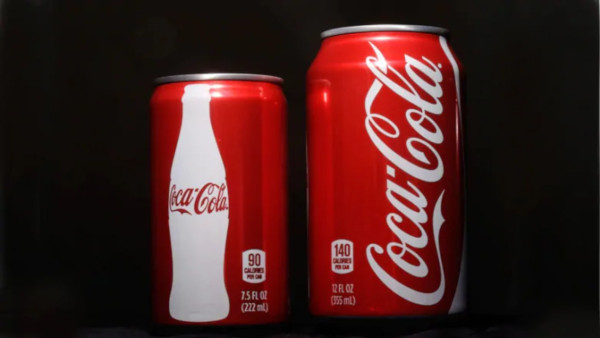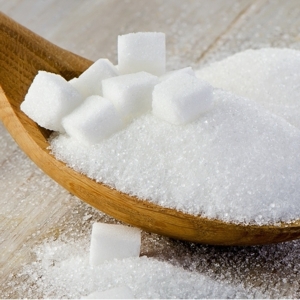It’s been well known for decades that excess Sugar in our diets can contribute to the development of obesity and, in turn, the many health issues that condition can trigger or exacerbate. Now, new research has produced findings that address a number of Sugar-related concerns…
 New smaller cans of Coke, Pepsi and Dr. Pepper products contain
New smaller cans of Coke, Pepsi and Dr. Pepper products contain
7.5 oz. / 222 ml of product – somewhat less than the traditional
12 oz. / 355 ml cans. No wonder they contain fewer Calories…
Sugary Drinks linked to cancers
French researchers have demonstrated a clear statistical link to excess Sugar consumption and the risk of certain cancers.
A study published recently in the British Medical Journal data-mined information collected under the massive French NurtiNet-Santé national health survey of more than 101,000 healthy people with an average age of 42 at the start. Participants were followed up for an average of 9 years.
Researchers compared the numbers of study participants who drank Sugary beverages (Soft Drinks and 100 percent Fruit Juices) with folks who drank Diet Soft (artificially-sweetened) Beverages with first reports of cancer diagnoses within those two groups. They found that an increase in consumption of only 100 ml a day of Sugary Beverages was associated with an increase of 18 percent overall cancers and 22 percent increase in breast cancer. Artificially-sweetened Beverages were not associated with increases in cancers of any kind.
Sugary Drink taxes reduce consumption
Researchers from the University of Otago in Wellington, New Zealand, combined evidence from settings where a Sugary Drinks’ tax had been applied and evaluated it in reference to changes in the sale of such beverages. Studies included four cities in the US: Cleveland, Ohio; Portland, Maine; Berkeley, California; and Philadelphia, Pennsylvania. A regional tax was studied in Catalonia, Spain, and the effects of country-wide taxes were studied in Chile, France and Mexico.
Lead Author Dr. Andrea Teng says the research takes a new approach in combining multiple studies examining the real-world impact of sugary drink taxes on sales, purchases and dietary intake before and after taxes were imposed, or between taxed and untaxed settings.
“This new review presents compelling evidence that sugary drink taxes result in decreased sales, purchasing or dietary intake of taxed beverages. For a 10 percent tax, sugary drink volumes declined by an average of 10 percent,” Teng explained. “It shows taxes on sugary drinks are an effective tool to reduce consumption, and we know from other research that the high consumption of sugary drinks increases the risk of obesity, diabetes and dental caries.”
‘Nudges’ improve effectiveness of healthy eating campaigns
New studies by researchers at L’Institut Européen d’Administration des Affaires (INSEAD), a graduate level business school operating in Asia, Europe and the Middle East. It’s known for its innovative programmes to foster the development of the leaders and management techniques of the future. Among its interests is whether active or passive marketing is more effective. To that end, a team of researchers looked at the relative effectiveness of both approaches and found that active marketing, consisting of ‘nudges’, works better than simply trying to change what people think about issues and products.
Cognitive nudges provide information, such as nutrition counts or making healthy options more visible on the shelf or on the menu. Affective nudges influence how people feel, without necessarily changing what they know, for example by touting the taste of the food, not its healthiness. Behavioural nudges try to directly change behaviours without necessarily changing what people think or what they want, for example by changing the amount of food on the plate or by making healthier foods easier to select and consume.
“Just changing the amount of food on a plate or the location of the food — without necessarily educating people about nutrition content or convincing them that they should eat healthily — is the most effective intervention because you don’t need to rely on changing people’s beliefs or their goals,” said Dr. Pierre Chandon. “There is tremendous potential to help people to eat better.”
One of the major applications of this theory is a multilateral Soft Drink Industry initiative to address growing criticism that Sugary Beverages are the main cause of excess Sugar consumption in the Western World. Pepsi, Coke and Dr. Pepper have joined together to use behavioural nudges – offering smaller single-serving containers of their Sugary products (for which they can claim lower Sugar content per serving) – and are marketing them in new and aggressive ways while assuring fans that the products have the same ‘great taste’, and touting improved nutritional statistics.
We’ll see how well this approach works when sufficient time has passed to take valid measurements based on product sales and consumer popularity surveys…
My take
Rather than reducing the amount of Sugary Pop they drink, I suspect at least some consumers of Sugary Beverages may just adapt to smaller containers by drinking more of them and perhaps exceeding their daily intake overall. Let’s not forget that Sugar is a highly addictive substance. Ad I’ve talked to the manager of my local supermarket. He says the beverage canners/bottlers have been looking for a rationale for raising the base price of their products. Creating confusion over the price of the goods by changing the size of the package may just fill that bill.
~ Maggie J.

